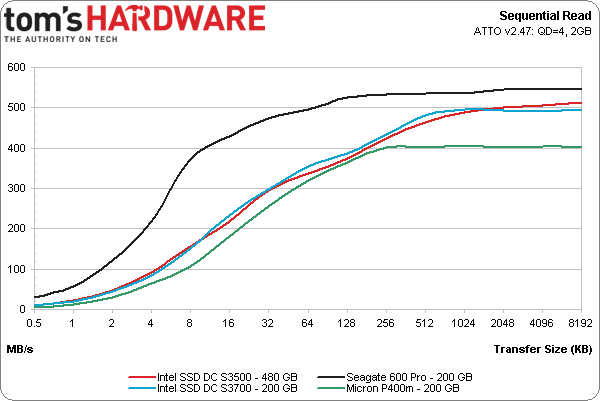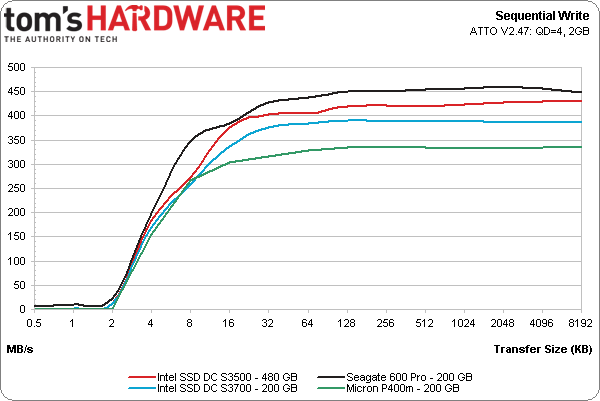The SSD DC S3500 Review: Intel's 6 Gb/s Controller And 20 nm NAND
As enterprise SSDs become more specialized and application-focused, Intel is hoping its SSD DC S3500 will strike a chord with customers looking for excellent read performance on a budget. We compare this drive to other notable contenders in its class.
Results: Sequential Performance
As with our random read numbers, the SSD DC S3500 and S3700 demonstrate almost identical sequential read performance. And perhaps that's the point; an SSD DC S3500 gives you comparable read performance at a lower price. The thing is, neither Intel SSD matches Seagate's 600 Pro, especially at low transfer sizes.
The performance curves come much closer to each other on sequential writes, though the 600 Pro is still roughly 10% better at larger transfer sizes.
The real problem Intel is going to have with its SSD DC S3500 won't be the 480, 600, or 800 GB capacity points. Rather, it'll be the smaller drives. Even though Intel offers a comprehensive line-up, the performance of lower-capacity models trails off fast. Let's compare the 128 GB Seagate 600 Pro with the 120 GB Intel SSD DC S3500.
| Header Cell - Column 0 | Intel SSD DC S3500 120 GB | Seagate 600 Pro 128 GB |
|---|---|---|
| Sequential Read | 445 MB/s | 520 MB/s |
| Sequential Write | 135 MB/s | 300 MB/s |
That's a hard sell when the 600 Pro is only slightly more expensive. Seagate does a great job of enabling outstanding sequential performance at the bottom of its 600 Pro family.
Get Tom's Hardware's best news and in-depth reviews, straight to your inbox.
Current page: Results: Sequential Performance
Prev Page Results: Enterprise Workload Performance Next Page Results: Enterprise Video Streaming Performance-
Mastle Hi, Think there's an error on page 1, $579 for 80GB drive......Surely won't be getting it at that price for my home build!Reply -
busuan Found myself suddenly losing interests in SATA SSDs after seeing the specs of PCIe SSD in the latest MBA refresh.Reply -
PapaCrazy An Intel 320 series SSD I put in my dad's computer just encountered the 8mb bug even though the firmware was updated with the "fixed" version. He uses the computer for business and I got him an Intel SSD thinking it'd be reliable. I think I'm gonna try Samsung next time around.Reply -
Evolution2001 Nitpicking here... but the article text is still wrong...or the math is. :pReply
''...we do know that the 800 GB model we're reviewing should run around $579. At ~$1.20/GB, ...''
800GB @ $1.20 = $960. -
drewriley Reply10952175 said:Nitpicking here... but the article text is still wrong...or the math is. :p
''...we do know that the 800 GB model we're reviewing should run around $579. At ~$1.20/GB, ...''
800GB @ $1.20 = $960.
Thanks, just can't seem to get the right combination of 4, 8 and 0. The 480GB version is $579 -
drewriley Reply10952165 said:An Intel 320 series SSD I put in my dad's computer just encountered the 8mb bug even though the firmware was updated with the "fixed" version. He uses the computer for business and I got him an Intel SSD thinking it'd be reliable. I think I'm gonna try Samsung next time around.
With the BAD_CTX_13X (8MB) failure, the fixed firmware fixed 'most' of them. The failure rates are quite low, especially after the FW 'fix', but if that one failure happens on the only drive you bought, it can really suck. As a consumer, I could care less if a million other people got a good SSD, if mine fails, I am upset. As an enterprise buyer, if one fails out a million, my company is throwing a party!
-
flong777 Why does Intel continue to release mediocre SSDs? Granted this performs middle of the pack but I just don't understand why a company with Intel's resources doesn't put out a top performer like the 840 Pro.Reply -
Grizely1 Reply10955531 said:Why does Intel continue to release mediocre SSDs? Granted this performs middle of the pack but I just don't understand why a company with Intel's resources doesn't put out a top performer like the 840 Pro.
Go back and read the article.
Or, learn the difference between consumer vs commercial. It's a DT (Data Center). -
flong777 Reply10959572 said:10955531 said:Why does Intel continue to release mediocre SSDs? Granted this performs middle of the pack but I just don't understand why a company with Intel's resources doesn't put out a top performer like the 840 Pro.
Go back and read the article.
Or, learn the difference between consumer vs commercial. It's a DT (Data Center).
Fair enough, I guess I should have been more clear. I don't understand why Intel is involved with so many mediocre SSDs - whether enterprise or consumer.
While I am not an enterprise user, I think I understand the basics. Enterprise SSDs are geared to handle heavy cues and write loads.
You have a point that it is not fair to compare enterprise with consumer - they are two different animals.

